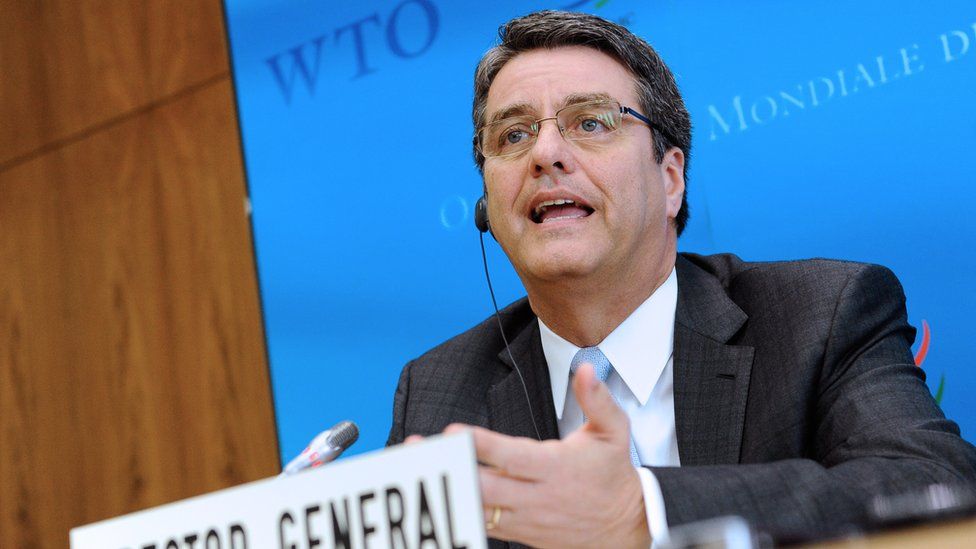What is the World Trade Organization?
- Published

The current director-general of the WTO is Roberto Azevedo
The World Trade Organization (WTO) is an international agency with 162 member countries and its purpose is to promote international commerce.
It has become closely associated with globalisation and is a frequent target for critics of the process.
The WTO's main functions are to provide a forum for negotiations to reduce barriers to international commerce, and to administer a system of rules governing trade.
The WTO was established in 1995, when it took over essentially the same functions from the General Agreement on Tariffs and Trade (Gatt), external, which came into force in 1948.
One of the motivations for creating the Gatt was a wish to dismantle the barriers to trade that had been erected between the two world wars.
Most economists regard the establishment of these interwar trade barriers as misguided and say they probably aggravated the Great Depression of the 1930s.
Uruguay Round
A series of eight "rounds" of negotiations, external under the Gatt led to the progressive reduction in trade tariffs - taxes which are imposed only on imported products.
The WTO was established in 1995, taking over from Gatt, which had overseeing international trade since 1948
The eighth and final such round, known as the "Uruguay Round" ended with a much wider agreement.
This went beyond the Gatt's focus on trade in industrial goods, and covered services, such as banking and telecommunications, intellectual property and agricultural subsidies.
The Uruguay Round, external also led to the establishment of the WTO with a new and more effective system for dealing with trade disputes.
The WTO has seen the launch of one new set of global trade negotiations. It is called the Doha Round;, external it was launched in the Qatari capital in November 2001. Progress has been very slow.
The Round has produced an agreement on "trade facilitation" which means improving customs procedures. Agreement on other aspects, including further reductions in tariffs and farm subsidies, has been elusive.
How the WTO is organised
The supreme decision making body of the WTO is the ministerial conference which meets periodically.
Much of the detailed negotiating is done by embassies in Geneva, where the WTO has its headquarters.
Rocky road ahead? In recent years, the lack of global progress has led some to sign more limited trade deals
The organisation provides a system for resolving disputes, when a country alleges that another has violated WTO rules.
The WTO's day to day business is conducted by its secretariat, with more than 600 regular staff under a director-general, currently Roberto Azevdo, a Brazilian diplomat.
The director-general is a key figure in leading negotiations, although decisions are taken by member governments. Mr Azevedo succeeded the France's Pascal Lamy in 2013.
More limited deals
Critics of the WTO, external argue that it is pursuing an agenda driven by business interests and that its rules undermine the sovereignty of its member states.
In recent years, the lack of progress in the Doha Round talks has led some countries to seek trade agreements among smaller groups.
Many critics of the WTO say it is pursuing an agenda driven by business interests
These include the Trans-Atlantic trade and Investment Partnership (TTIP), external, a negotiation underway between the EU and US - and the Trans-Pacific Partnership (TTP), external, which also involves the US.
As the negotiating effort of major governments has shifted towards these agreements, so has the attention of critics. All the leading world economies are members of the WTO.
European Union countries are all members, but they act together in the WTO as the EU. As well as its existing 162 members, a further 21 countries have applied to join the WTO, including Iran, Iraq and Syria.
Negotiations can be very slow. Algeria for example applied in 1987 (to the WTO's predecessor, the Gatt) and has still not agreed membership terms.